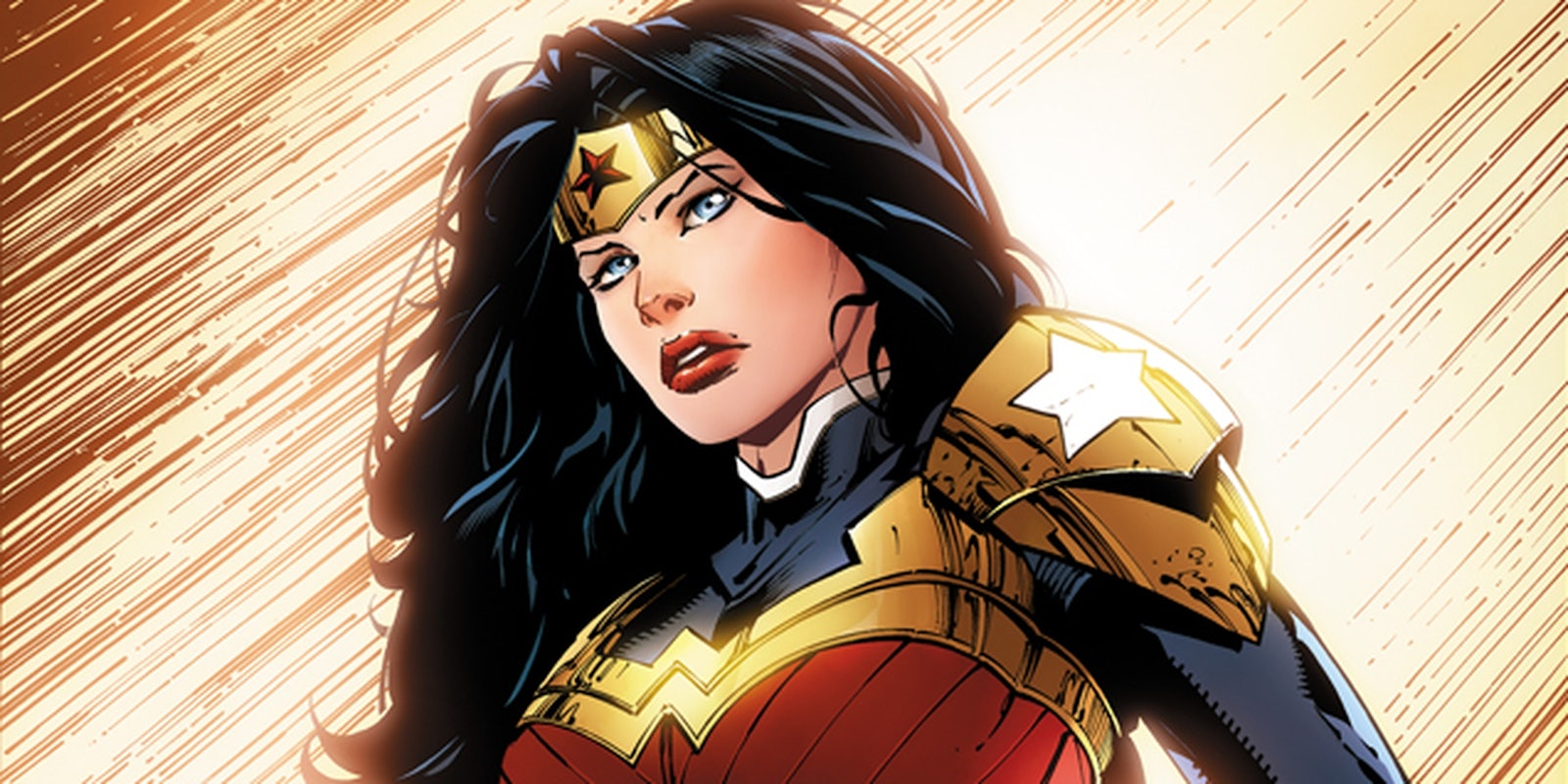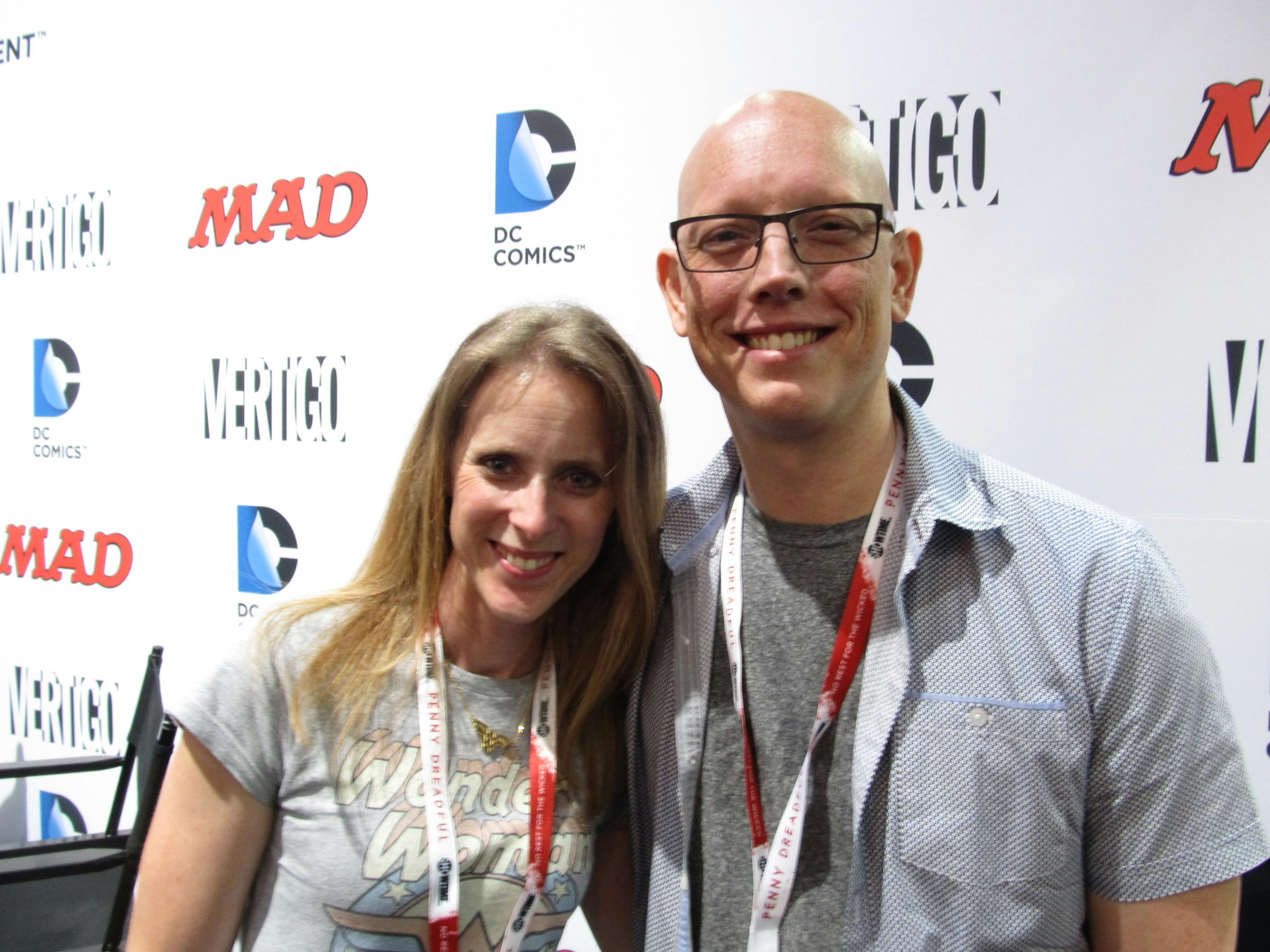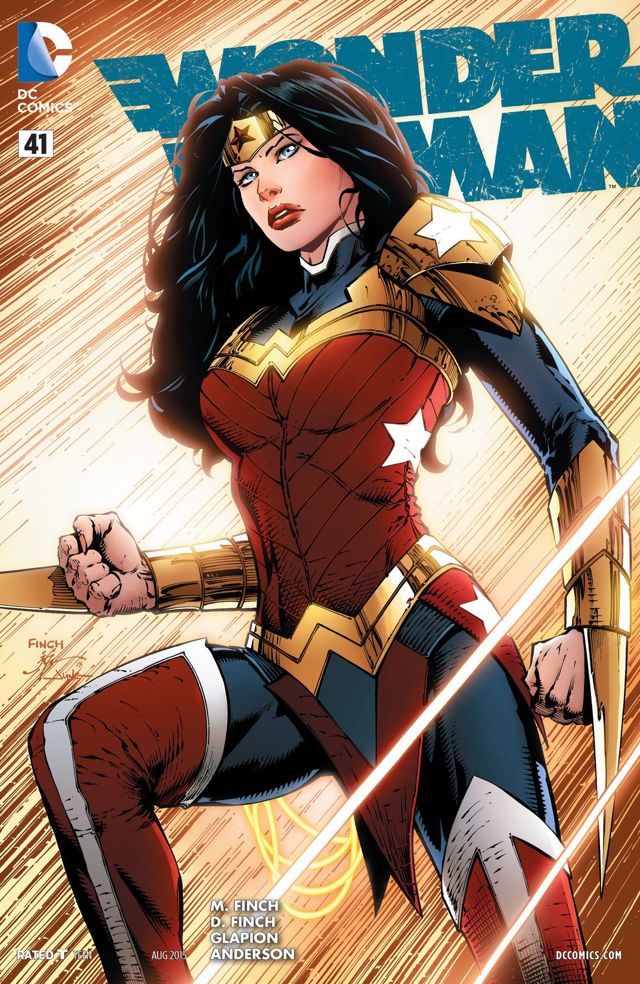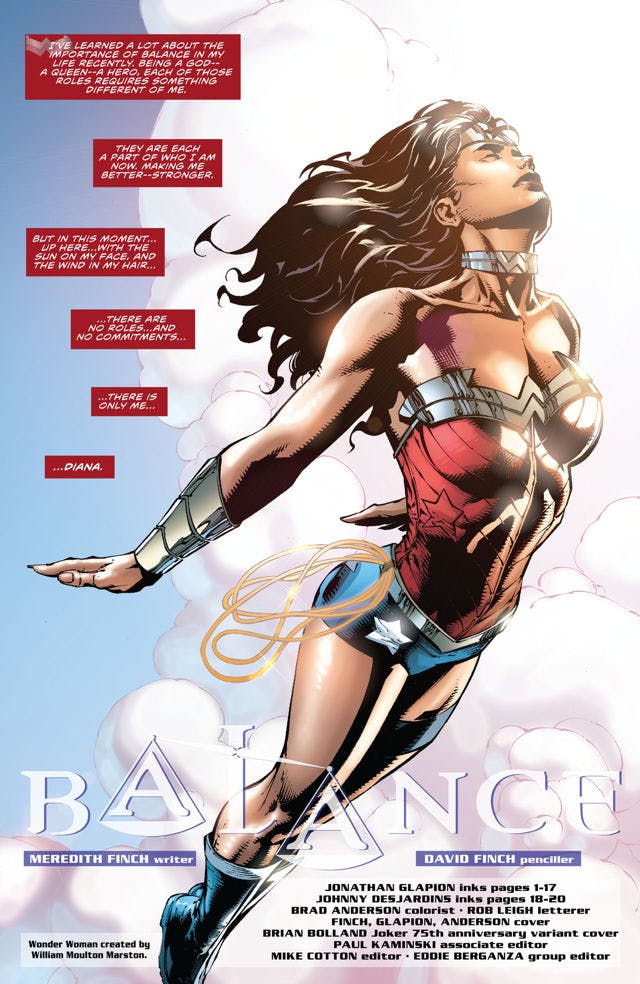“Is that David Finch?” says the fan next to me at the crowded DC booth at the San Diego Comic-Con Exhibit Hall, craning for a better look. “Holy shit.”
This may be the only appropriate reaction for an artist whose work on such titles as Ultimate X-Men and Batman: The Dark Knight has made him a comics legend—but it’s only half the picture. Standing next to Finch on the showroom floor is is his wife, Meredith Finch, a rising star of the comics world who’s received nothing but praise since she became writer of Wonder Woman with her husband serving as penciller.
In the year since the duo took over the series, they’ve had ups and downs, with Meredith having to qualify a previous interview in which David expressed reservations with labeling Wonder Woman feminist. “Absolutely, Wonder Woman is a feminist icon,” Meredith insisted. More recently, a forthcoming new full-cover redesign of Wonder Woman’s costume attracted mixed reactions from fans, with many praising it as a welcome change, while some, including Image co-founder Erik Larsen, saw it as impractical and a bow to political correctness. On the other hand, with interest in Batman v Superman at its peak and a Wonder Woman movie following in 2017, there’s never been a better time to be a fan of the mighty Amazon.
The most recent issue, Wonder Woman No. 41, sees the beginning of a new arc for the hero, complete with her brand-new costume. We caught up with the Finches at Comic-Con and found out about how they’re dealing with the movie, Diana’s new look and new job, and a turbulent 12 months in geek culture.
You’ve been writing Wonder Woman for about a year. What, for you, has been the biggest challenge of writing in the shadow of the movie?
Meredith Finch: The movie’s coming out, but all you’ve seen are really just images of the character, and it’s very difficult to know how she’s really gonna be defined. Geoff Johns is involved, and he is brilliant when it comes to character development, so I know she’s going to be spectacular. And I think that Gal [Godot] has really embraced the character and I can’t wait to see what she does. But we’re really trying not to focus on the movie as anything other than a separate entity at this point. We’re doing our part.
David Finch: Ultimately the movies are what everyone sees, they’re the big thing, and we’re very small in comparison. But what comics have that’s special—for me, it’s the art, I love the art—but it’s kind of pure creativity. One book doesn’t necessarily 100 percent reflect the other. There’s so much room for people to just be creative and do their own versions. We’re kind of R&D for the movie, so I never really feel that much of a mandate to make what I’m doing reflect the movie. It’s actually kind of the other way around: They won’t necessarily take from what we’re doing, but they’ll certainly take from all the years of Wonder Woman’s history. It’s a little bit the other way around, despite the fact that, you know, we’re pretty small.
Over the years, Wonder Woman has served as a cultural marker for a variety of different things. In the ’40s she was a war hero, in the ’50s she became a bit of a domesticated damsel, and in the ’70s she emerged as a feminist icon. Last year, you guys sort of famously said that she was, above all, a humanist. It’s been a really turbulent year. There’ve been a lot of things that have happened—Gamergate, the Batgirl cover, and that’s just in geek culture. At this point, as a cultural marker, what do you feel she represents?
MF: I still, first and foremost in my mind believe that at her core she’s about love. I still do believe that she fights for everybody’s rights—not just the rights of women, not just the rights of the downtrodden. She really wants everybody to have every opportunity that they’re entitled to and that they deserve.
With her becoming the God of War, do you feel like a bit of that turbulence has crept in?
MF: I feel like her being the God of War is really a struggle for her, as well, because she’s representing something she’s diametrically opposed to. It’s gonna continue to be a struggle for her, finding that balance, and we’re going to continue weaving into our story the fact that other people are seeing that, too—that she’s not fulfilling that role as it should be fulfilled, as the God of War. And that’s going to be a major part of our story in this next arc. It’s the driving factor behind our new villain, Aegis, and the character driving or supporting him.
DF: I think that Wonder Woman, like all the characters, means so much to so many different people. It’s very important to both of us—it was important to me, drawing Wonder Woman, I wanted to make sure that Wonder Woman is not a character who’s drawn on the page for men to look at. I wanted her to be drawn on the page for everyone to appreciate and for women to be able to look up to, and to be something to look up to. That was very, very important to me.
There’s been a whole bunch of cultural conversations about costuming, with a lot of characters but specifically with regard to Wonder Woman. Do you feel that cultural nexus is driving that or are we just evolving our appreciation—?
DF: No, I think the culture is changing right now. It really is. It’s going something that was maybe the domain of a smaller group to something that’s global, and universal. It’s nothing but a good thing. I go to conventions now and the people that I see, it’s so different than even five years ago. It’s everyone. So, yeah, it’s important to both of us to make sure that everything we do—I want everyone who reads it to be able to see themselves in it somehow.
MF: We’re standing here at San Diego and I’m looking over at the new DC Girls lineup. And I think that is a perfect representation of what we should be doing with costumes and superheroes in general: making them accessible for little girls as well as 40-year-old men. The movies are so broad-reaching that I think it’s fantastic that the companies are making the shift and representing their broader readership now.
Regarding what you said about Wonder Woman’s work-life balance: in Superman and Wonder Woman, she’s been having some turbulent relationship issues. In the past that’s bled into your series, and I was wondering if that was going to have any repercussions.
MF: We did bring Superman into our last arc, but I really felt like for this arc, I wanted to focus not on that relationship, because there is the book for that relationship, and instead focus on the other women in her life. So you’re really going to see her relationship with Donna, and how that’s evolving. And—I wanted to develop more friendships for her. So we’re gonna see some more of that dynamic with Hessia and Zola and Hera. Because one of the biggest things for women, I find for myself, and I’m sure most women can relate to this, is your support group, and your support family.
DF: Guys are like that, too! Guys have friends!
MF: Not the way women are! So I really wanted to make sure I firmly establish that for her as well.
What so far has been your favorite part of this arc?
MF: Watching David draw it. Hands down.
DF: Awwww.
MF: Watching him, Issue 36, for the very first time, seeing him put down and realize in a drawing, what I had in my head and what we had talked about, was such an incredible experience for me. I don’t know who I would work with going from him, because he’s my favorite artist, and I really—it’s been so much fun. It doesn’t feel like work. Every day is just a joy.
DF: For me, it was watching Meredith write the first page.
MF: Awwww.
DF: I think for me it was, even halfway through, from the beginning to where I am now, I started to get a sense of who she was—I want to say, visually, but I really need to know a character for myself before I can kind of get that. There’s only so much I get from reading and from appreciating a character. I really have to get in there and get a feel for it. It took me a little bit, I think? And I really—when I’m drawing her on the page now I feel like I know her—and not just her, but a lot of the people around her. I always hate it when I’m on a book not long enough to really get to that point, and I’m liking that we’re there and I want to stay here for a while.
Photo courtesy DC Entertainment
Enjoy the article? You’ll love our video. Check out the latest from DotGeek on YouTube.





